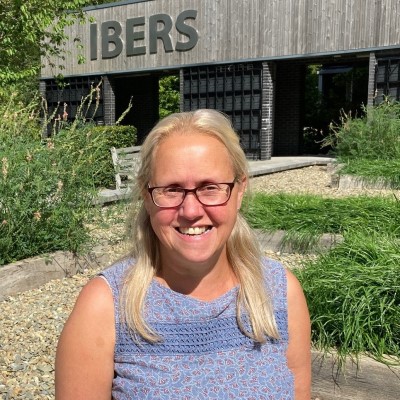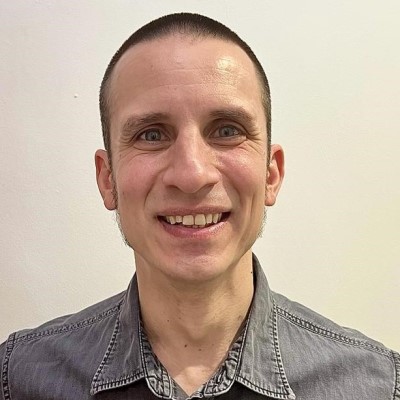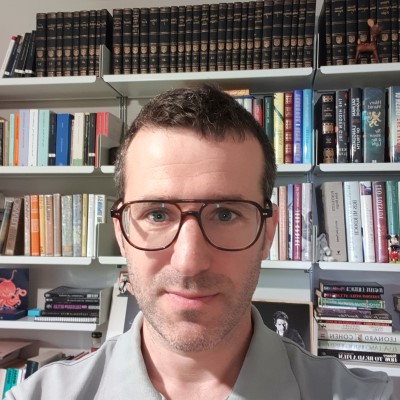CIEL | Meet the Scientist
Dr Adam Hayward
Research Fellow

Adam’s role is to bring data-driven approaches to research on livestock diseases, particularly helminth parasites of sheep and cattle.
Animals vary enormously in their resistance to infection, and in how infection affects their performance. Through his research, Adam aims to identify the causes of this variation to find ways of limiting the effects of parasites on livestock.
What project/s are you currently working on?
We’re just starting our latest round of Scottish Government work at Moredun, and I have three projects included in that.
- The first links veterinary medicine data from beef farms with carcass parameters, in order to see what treatments are being used and when, and how treatments are associated with performance.
- The second studies tolerance of gastrointestinal worms in sheep and asks how much animals vary in their tolerance of worms, and how it’s related to age, sex, resistance to worms and overall performance.
- Thirdly, we’re looking at how ageing affects performance in ewes across life – I’m interested in whether different traits age in different ways and whether there are trade-offs between them.
I’m also involved in projects looking at the effects of liver fluke-TB co-infection on carcass parameters in beef cattle; evaluating the use of technology on sheep farms; and studying host-parasite interactions in wild Soay sheep.
What capability are you drawing on to deliver the research?
My own expertise is in analyzing large and complex data sets. Essentially, I use statistical analysis in order to tease out the important factors that drive the outcomes that we’re interested in explaining, whether that be performance in beef cattle, or parasite resistance in lambs.
Meanwhile, the prospect of working in the lab brings me out in a cold sweat, so I’m lucky in that I have fantastic colleagues at Moredun. Our Bioservices team manage the animals day-to-day and we have an incredible parasitology lab with a big team of researchers, all of whom get involved in sampling animals and processing samples in the lab.
Similarly, researchers in immunology are experts at analyzing different aspects of the immune response to infection. At Moredun there is also a real mix of researchers: some have veterinary backgrounds and others have grown up on farms or are still involved in farming, which really helps with identifying important research questions. We also have an amazing Communications team that help to disseminate the research to farming and business stakeholders, maximizing the impact of the research.
What would be your ideal research project assuming no barriers to resources?
This is a tough one! I suppose I should say it would be developing a vaccine or product against some important disease, but I have to say I’m in absolutely no way qualified for that!
I believe things that happen under controlled settings (such as in a lab or a drug trial in housed animals) often bear little resemblance to what happens under ‘real’ conditions, whether that be in wild animals or on a farm. I would conduct an intensive survey of animal health on a large number of farms over several years. By ‘intensive’, I mean animals would be weighed, blood sampled, faecal sampled and health checked every couple of weeks, building up a biobank of samples that could be interrogated.
By monitoring many individual animals, over many farms, over several years, one could really unpick and establish the drivers of disease outbreaks, and, importantly, identify characteristics associated with resistance and resilience to disease – crucially, under ‘real’ conditions. This would enable, for example, the early signs of outbreaks to be identified and hence stopped, and also the identification of how breeding or management could improve animal resistance and resilience to multiple threats.
How did you arrive at doing what you do now?
I did a Biology degree at the University of Nottingham and then a PhD at Edinburgh, finishing in 2011, looking at host-parasite interactions in wild Soay sheep on St Kilda. I did plenty of fieldwork, but most of my project was spent analyzing a database collected on the population since 1985, so this is where I began to hone my statistical skills.
I then changed tack slightly and did post-doctoral research in Sheffield on recent human evolution, analyzing data from Finnish church records collected between the 17th and 20th centuries – which most people find either fascinating or completely bizarre!
I then moved to Stirling and back to the Soay sheep, where I did a 3-year fellowship studying interactions between reproduction and resistance to worms. In 2018, I moved to the Moredun Research Institute where my role is to both develop data-driven research projects and collaborate with other researchers who can make use of my statistical knowledge. I’m a very collaborative researcher and am always very keen to get my hands on new data sets and engage with new research topics – having a diversity of projects is probably the aspect of my work I enjoy the most.
How could your work benefit CIEL Members and the wider industry?
Livestock science, and the industry as a whole, is really facing an explosion of data – people at every level of the supply chain are collecting more data than ever before on every aspect of their operations. To me, data-driven research is essential if we are to make the most of this data – otherwise, there is very little point in collecting it.
From a livestock disease point of view in particular, seeing animals as variable individuals, rather than simply clonal members of the same group, is increasingly apparent – for example through things like such as targeted, selective treatments. Making use of this wealth of animal-level data in order to understand the factors that drive this variation between individuals is really what my research is about. At Moredun, we’re particularly keen that our research is of practical use to farmers, and it is towards farmers that most of my research is directed, whether that’s trying to find which diseases have the biggest impact on animal performance, or trying to find ways of mitigating the impact of parasites on animals. I’m always keen to find new sources of data to try to exploit to see if we can make a difference.







